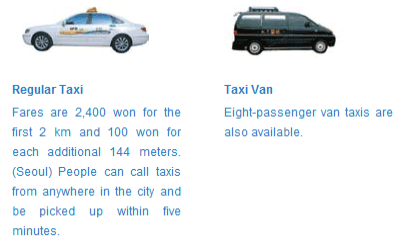
Korea's public transportation system is very extensive and cheap, accessing almost every place imaginable. Roads are often jammed, especially during weekends and holidays so it is best to use public transportation. Purchasing a debit transportation card will be useful as there are no extra costs when you transfer from a bus to a subway or from a subway to a bus. Remember to put your debit transportation card every time you get off the bus or the subway.

The subway is the most efficient and convenient way to get around Seoul, Busan, Daegu, Gwangju, Incheon and Daejeon. Subways have developed into these cities' main transportation systems and provide fast, safe, and comfortable rides. The Seoul Metro links all neighborhoods with the outlying areas and satellite cities. Fares vary according to destination, the basic fare being 1,250 won (US$ 1.12). Passengers can easily pay bus and subway fares and receive free transfers by using a debit card, known as T-money.

The Korea Railroad (KORAIL) operates three types of trains along an extensive nationwide network: high-speed (KTX), express (Saemaeul), and local (Mugunghwa). The KTX trains link Seoul with Daejeon, East Daegu, Busan, Gwangju and Mokpo. Most popular destinations in the nation can be reached via direct line or a single transfer. Check Korea Rail's website (www.korail.go.kr) for information about combination train-ferry tickets and rail passes available. (Note: Rail passes are only available to inbound tourists and must be purchased from certified Korail vendors overseas.)
One of the fastest and convenient ways between Incheon International Airport and Seoul. Airport Express(AREX) operates Express Train and Commuter Train for tourists who need their comfortable journey. For more information about AREX, go to www.arex.or.kr.

Regular intercity and long-distance express bus networks connect virtually all cities and towns in the country. Regular intercity buses are the least expensive way to travel around the country but make frequent stops. Bus fares range from 1,000 to 1,950 won (US$0.9~1.76). The wibsite "www.visitkorea.or.kr" has detailed information.
Long distance express buses go directly to their destinations, stopping
only at expressway rest areas every few hours. Two types of buses link
every major city in the country. Regular buses have four seats per row. T
he more-expensive deluxe buses have only threee seats per row and
offer amenities such as phones and movies. Some lines run late-night
deluxe express buses as well.
Seoul has three intercity terminals providing service to different parts of the country: the main Express bus Terminal on Subway Line 3, 7 or 9 and Nambu Bus Terminal on Subsay Line 3 in Gangnam and the Dong (East) Seoul bus Terminal near Gangbyeon Station on Line 2. Busan's Express Bus Terminal is in its eatern downtown area.
Koreans who are sitting sometimes offer to hold the packages of those people who must stand. If you are standing and a seated Korean starts to take your belongings and place them on his or her lap, do not panic and yell for the police. When you or the person sitting down leaves, the person will hand the items back to you.
There are two kinds of taxis: regular and deluxe. Fares are based on distance and time. The black deluxe taxis are more comfortable, provide better service and, therefore, charge more than the regular taxis. Nearly all taxis are equipped with a free third-party interpretation system that can be accessed by cell phone if passenger and driver have difficulty communicating.

Driving can be an exciting and effective way of getting around Korea. Extensive road and expressway networks are available, which means you can visit every corner of the country easily.
Rental fees vary from 60,000 to 460,000 won (US$ 54.15~415.16) per day, depending upon the type of car. The speed limit is 60kph for most roads in the city and 80-100kph on expressways. Driving under the influence of alcohol or drugs is a felony that may result in a heavy penalty.
Taking a ferry is one of the most pleasant ways to see Korea, popular mainland to island ferry routes are Busan to Jejudo, Mokpo to Hongdo, and Pohang to Ulleungdo. There are ships making runs between Busan and Yeosu, with many in-between stops possible at ports along the south coast and Hallyeo Maritime National Park. Click on the website "www.visitkorea.or.kr" for more information about transportation and many other tourist-related information.

Korea is connected by air to every major capital in the world, either through direct flights or by connecting flights from major international airports in East Asia. About 52 interdnational airlines maintain regular services, with over 1,876 flights into and out of Korea every week. Korea has eight international airports: Incheon International Airport, which opened in March 2001, and Gimpo for Seoul, Gimhae for Busan, Jeju, Cheongju, Daegu, Yangyang, and Muan. Gimhae and Jeju operate direct flights to and from Tokyo, Fukuoka, Nagoya and Osaka in Japan.
Most domestic destinations are within an hour's flight from Seoul. Located between the western area of Seoul and the newer Incheon International Airport, Gimpo Airport is primarily used for domestic travel and short flights to Japan and china.
Korea has two major airlines: Korean Air and Asiana. Korean Air belongs to Skypass and Asiana is a member of Star Alliance. Both airlines offer international and domestic service. No flights exceed an hour in length. Fares are generally the same, any day and at any time. There are usually no extra fees for weekends or holidays, and advanced purchase is not required, though you should reserve in advance during busy times.
Image Source
* http://www.korea.net/AboutKorea/Tourism/Transportation
Contents Source
http://www.korea.net/AboutKorea/Tourism/Transportation
